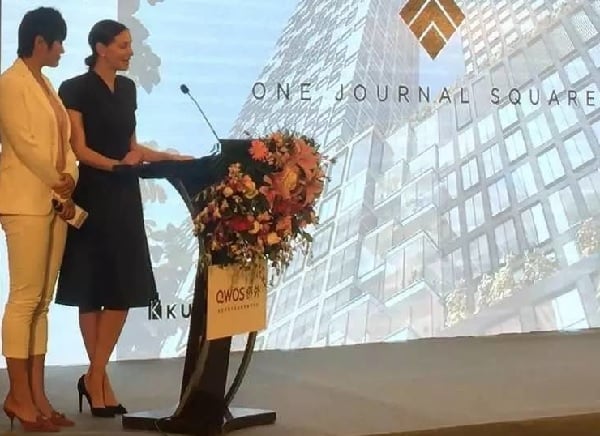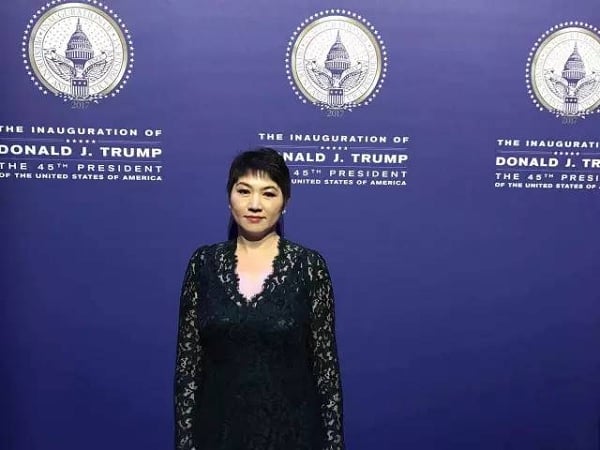
The Art of the Deal?: Chinese president Xi Jinping and U.S. president Donald Trump.
Russia isn’t the Trump administration’s only foreign conflict of interest problem. President Donald Trump, his daughter/senior adviser Ivanka Trump, and son in-law/senior adviser Jared Kushner also have a growing China problem.
At a Beijing hotel on May 6, Jared Kushner’s sister Nicole Kushner Meyer appeared before a crowd of wealthy Chinese investors to pitch an investment scheme for a Kushner Companies luxury apartment complex in Jersey City, New Jersey known as “One Journal Square” that would help Chinese investors secure U.S. visas and green cards. Meyer repeated her pitch to investors in Shanghai on May 7, and planned to do so in other Chinese cities. Meyer highlighted her ties to the Trump administration through her brother Jared, raising concerns over conflicts of interest and drawing harsh criticism back home in the United States (Video: Bloomberg, CBS, CNN, MSNBC, Reuters).
Negative media attention to the Kushners’ activities in China led to a half-apology from the Kushners and cancellation of further Kushner appearances in China, but doesn’t seem to have dampened Chinese enthusiasm for the Kushner “visa-for-sale” scheme. This is not the only time that conflict of interest questions have been raised regarding Trump-Kushner business ties with China.
A brochure for Jared Kushner’s sister Nicole’s event in Beijing read: “Invest $500,000 and immigrate to the United States.” The visa scheme in question is the controversial EB-5 visa or “golden visa” program for wealthy investors (which has been called “the ‘crack cocaine‘ of real estate financing”), from which the extended Trump-Kushner real estate family has previously raised Chinese money, and which President Trump extended “without long-promised changes” the day before Nicole Kushner Meyer appeared in Beijing.

Nicole Kushner Meyer, in black, speaks at EB-5 investment pitch in Beijing, May 6 (ABBAO).
The Kushners’ partner in China is Beijing-based Qiaowai [Overseas] Group (侨外移民 or 侨外集团, QWOS). Other U.S. partners for the project include New Jersey private equity firm KABR Group and Florida-based EB-5 “shady broker” the U.S. Immigration Fund (USIF). Qiaowai CEO Ms. Ding Ying (丁颖, aka Vivian Ding) attended President Trump’s inauguration in January 2017 and reportedly met Trump and members of the Trump-Kushner family. Ding has touted her attendance at the inauguration for marketing purposes in Chinese media and and at Kushner events in China.
As veteran China reporter Bill Bishop observes, it appears that Ding “knows how to work American politicians” and how “to navigate the swamp to hawk EB-5s”: In April 2016 according to Chinese media, former New York mayor and Trump surrogate Rudy Giuliani appeared with Ding and USIF chairman Nicholas Mastroianni II in Beijing to promote a Times Square EB-5 investment scheme. Giuliani appeared again with Ding and Mastroianni at a high-priced November 2016 EB-5 “forum and showcase” in Shanghai. Incidentally, Mastroianni also contributed $100,000 to Trump’s inauguration fund (See also New York Times).

Qiaowai CEO Ding Ying at Trump inauguration (ABBAO),

Rudy Giuliani and Ding Ying promote EB-5 scheme in China (QQ).
The Kushners were apparently not prepared to deal with U.S. media attention to their activities in China. Journalists from The New York Times and The Washington Post were forcibly removed from the event in Beijing, and reporters were barred from the event in Shanghai. Reporters in Beijing were told, “This is not the story we want.” Nicole Kushner Meyer hung up on a reporter from The Wall Street Journal when contacted by telephone in Shanghai.
Washington Post researcher Congcong Zhang wrote on Twitter that she was threatened for covering the Beijing event. “I was threatened, harassed and forced to delete recordings and photos of the Kushner family recruiting Chinese investors in U.S. Green cards,” said Zhang, adding that “People from the Chinese company that works with the Kushners on the investment visa surrounded me and grabbed my shoulder…. They tried to force me to leave, then grabbed my phone. I could only get it back if I agreed to delete all recordings and videos.”

Kushner investment pitch in Beijing, May 6 (Javier Hernandez via Twitter).
The Kushners’ activities in China have drawn harsh criticism from across the U.S. political spectrum. To many observers it appears that the extended Trump-Kushner family is treating the U.S. presidency as a business platform. Nor would this be the first time the Trump-Kushners have been accused of running the White House “like a family business.”
“It’s highly problematic,” Noah Bookbinder, executive director of Citizens for Responsibility and Ethics in Washington, told National Public Radio. “It appears that Jared Kushner’s family business is using his name and his official position to bring in investment.” Bookbinder and former Obama administration ethics adviser Norman Eisen wrote in The Washington Post that “this sales pitch is clearly unacceptable” and that “Jared Kushner and Ivanka Trump should recuse themselves from China policy.”
Former George W. Bush administration ethics adviser Richard Painter called the Kushners’ actions in China “corruption, pure and simple,” an “abuse of power,” and “very, very close to solicitation of a bribe.” Painter also wrote on Twitter that incoming French president Emmanuel Macron “should ask that the Statue of Liberty be returned to France and replaced with a giant statue of Jared Kushner with his hand out.”
Kushner Companies has since half-apologized for name-dropping its White House connections to promote its investment scheme. “Ms. Meyer wanted to make clear that her brother had stepped away from the company in January and has nothing to do with this project,” said a Kushner Companies spokesperson, “Kushner Companies apologizes if that mention of her brother was in any way interpreted as an attempt to lure investors. That was not Ms. Meyer’s intention.”
Following extensive and embarrassing media coverage of its activities in China, Kushner Companies backed out of planned further appearances in Guangzhou, Shenzhen, and Wuhan. According to Hong Kong’s South China Morning Post, however, rich Chinese investors are more eager than ever to invest in the Kushners’ EB-5 scheme, and showed up in droves to the event in Shenzhen despite the Kushners’ absence. As Reuters reports, Qiaowai’s promotional materials have continued to tout its Trump-Kushner connections and to “guarantee” green cards for investors in violation of U.S. EB-5 rules.
Now U.S. Senator Chuck Grassley (R-IA) is calling for an investigation into “potentially fraudulent statements and misrepresentations” by Kushner partners Qiaowai and USIF. In a May 25 letter to the Department of Homeland Security and the Securities and Exchange Commission, Grassley wrote that “a closer look” at Qiaowai and USIF is “clearly warranted, as reports suggest both companies have long employed questionable practices.” Additionally on June 1, Democratic members of the Senate and House Judiciary Committees sent a letter to Kushner Companies requesting information on how it has used the EB-5 program and expressing concerns that Kushner Companies and its partners “may be seeking to benefit from the Kushner family’s connections to the White House.”
On June 5 it was further revealed that Kushner Companies is seeking a $250 million loan to pay off investors, including Chinese EB-5 investors, in a luxury Jersey City apartment tower known as “Trump Bay Street.” Major U.S. banks are hesitant to lend on the project due to its connection with Jared Kushner, the Trump administration, and the controversial EB-5 program, so unregulated lenders and foreign banks are likely to fill the void, potentially adding to the vast Trump-Kushner array of foreign conflict of interest problems.
As noted above, conflict of interest questions have previously been raised regarding Trump-Kushner business dealings with China. Trump Tower’s biggest commercial tenant is Chinese state-owned Industrial and Commercial Bank of China (ICBC), which is due to renegotiate its lease during Trump’s term as president. Since his inauguration, Trump has won Chinese government approval for 38 new Trump trademarks in China; and Ivanka Trump’s clothing company won approval for three new trademarks in China on the day she and her family dined with Chinese president Xi Jinping at Mar-a-Lago, Trump’s private Florida resort, in April.

All in the Family?: Trump-Kushner and Xi Jinping families at Mar-a-Lago (large).
Ivanka Trump has also come under fire for reported sweatshop conditions at factories in China where her company’s products are made. The recent arrest and disappearances of investigators looking into conditions at these factories in China prompted The Washington Post to ask, “Is China offering Ivanka Trump unseemly favors?”
If so, then it seems reasonable to ask what China might expect in return. Since former China-hawk Donald Trump’s inauguration as president, China has already secured Trump’s obeisance to Beijing’s “one-China policy” on Taiwan, Trump’s inaction on Chinese expansionism in the South China Sea, Trump’s silence on human rights, and Trump’s dictator-love for Xi Jinping. What more could China want?